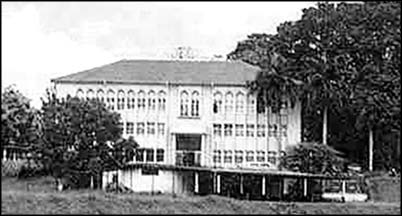|
Universities, Doctors and Society - Part II:
Universities and student activism
Vidya Jothi Prof. Arjuna Aluvihare, Emeritus
Professor of Surgery, University of Peradeniya delivered the Sujata
Jayawardena Memorial oration, organised by the Alumni Association of the
University of Colombo, last December.
Interactions
Today I feel sad to see the high pig mesh railing outside the Senate
House premises of the University of Colombo, and the fortification of
the UGC, and worry that this physical barrier means less dialogue with
the inflow and outflow of ideas, and may be a feeling that less is
necessary between students (University) and establishment (Society) - a
recipe for disaster. I was pleased to see none such in Peradeniya even
at the VC’s residence and the Senate House (where of course such
barriers would be impossible to construct). Interaction is necessary
even at some risk.
Student and staff interaction with society is essential as society
needs and must breed and mould ‘universities’/ training bodies and
‘universities’ must deliver societies’ expectations, society must
nurture ‘universities’, society (including ‘universities’) must correct
society -peacefully in keeping with status and society must respond to
correction.
Doctors
What about Doctors? They are products of and nurtured by family,
society and University and Prevent and Manage ill health. Society and
University have obligations to facilitate maximum performance from
Doctors and Doctors have obligations to Society (and University- Alma
Mater). Doctors and Society (patients and others) have ‘Rights and
Obligations’ in respect of each other and themselves.
|

Peradeniya University |
In the International Human Rights documents it is clear that both
groups have rights, and both need to recognize this. The other side of
the ‘rights coin’ is the matter of the obligations they have to each
other. Which group has priority- doctor or society? I feel the least
powerful and most disadvantaged has to have priority- patients rights
and doctors obligations to society should have pride of place therefore.
There are not enough doctors in Sri Lanka (judge by queues in the
public and private sector); those we have are very able and skilled, are
from many social strata and this input enriches the system, work in
medically and physically risky situations- including lady doctors, work
very hard for a relatively low formal emolument, have many
‘distractions’ in order to boost income, but sometimes display attitude,
communication, turf and availability problems.
Hippocrates
Historically there are doctors’ oaths and codes of conduct- the oath
of the Greek Hippocrates and that of the Arab Physician Ibn Sina are
amongst the best known older ones. The current Sri Lankan one includes
requirements of not with-holding services, not criticising each other or
degrading the profession, and maintaining Integrity and propriety.
Doctors should honour teachers, and share resources and cooperate with
other health professionals.
They can expect support from Society- a fee is acceptable (a 15th
Century document quotes an 11th Century doctor who advised his juniors
to send a poorly dressed spy to patients houses before fixing a fee as
patients tried to dress below their level of wealth hoping to reduce the
doctor’s fee. )
A digression for a moment: on a recent visit to India during which
there was an opportunity to visit Raipur- where there is in Prison, a
Paediatrician and Community doctor who has done much grass roots and
innovative work to create health facilities, recruit rural people in
measures to prevent and manage malaria, TB and other problems, and raise
consciousness of what can be done by people to help themselves.
He is prison for being outspoken about his perception of rights
abuses of rural people by terrorists and vigilantes and consequently is
accused of siding with terrorists. Here society by imprisoning him, has
perhaps betrayed the doctor who is trying his very best for society in a
holistic manner. Interestingly in his enforced absence some of his work
is being done almost on a voluntary basis by graduates of a very
prestigious Indian Medical College- the All India Institute if Medical
Sciences.
Interaction
A proper interaction between society and doctors is at strain in Sri
Lanka with a breakdown of mutual obligations. The recent killings of
doctors in the South and East are a terrible betrayal by society of
doctors.
The withdrawal of services of doctors as a mark of condolence for the
killing in the South is not correct. At the risk of being accused of
degrading the profession I would add that the withdrawal of services
(strikes) by doctors is never correct or acceptable, and is a betrayal
by doctors of their obligations: it should never happen. The same
applies to the reaction to the tragic and unacceptable killing of the
doctor in the East. About this type of incident one would hope a secret
attempt is made to ensure that all armed parties agree to leave health
services alone and not make them conflict issues, and allow them to
function with safety to staff and patients.
At the same time it is tragic that the Administrative and Political
authorities seem unable to act on obvious and genuine doctors’ issues
without a strike or threat of it.
This is a breakdown of society’s obligation to doctors, as is the
matter of inadequate provision of facilities to maximize quality output,
and also inadequate pay and other facilities.
On the other hand again a rushed and excess business orientation of
doctors, inadequate communication with patients, and the matter of the
brain drain represent a lack of recognition by doctors of their debt to
and obligations to society. Ultimately perhaps doctors’ failures and
administrative failures represent a failure of the University system to
communicate to its graduates the extent of their debt to society and the
ways in which this debt should be honoured.
To be continued
|



